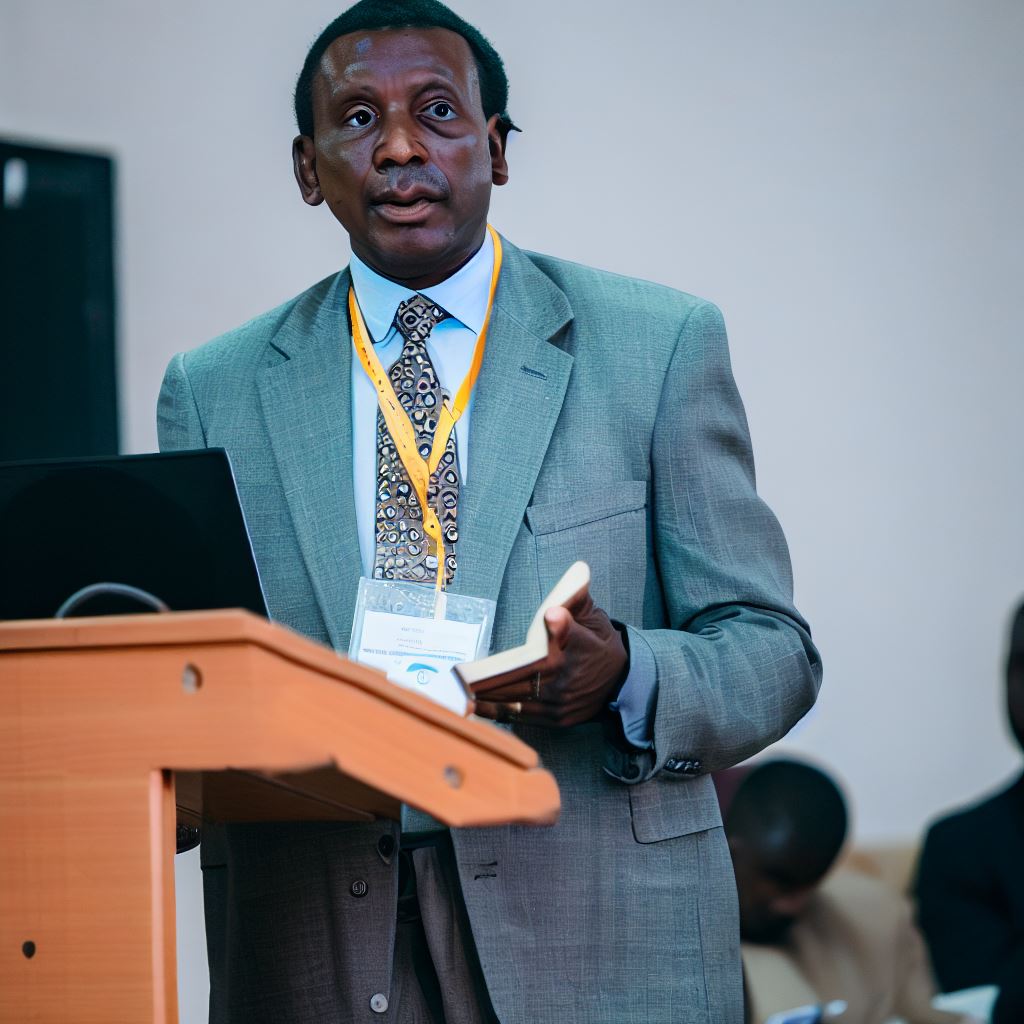Introduction
A. Importance of Pastors in Nigeria
Pastors hold a crucial role in Nigerian society, providing spiritual guidance, community support, and leadership.
B. Thesis Statement
This blog post is your comprehensive career guide if you aspire to become a pastor in Nigeria:
- Exploring the pastoral calling.
- Educational and theological requirements.
- Navigating cultural and societal challenges.
- Building effective pastoral skills.
- Finding mentorship and support.
- Steps to becoming a recognized pastor.
- The rewards and challenges of pastoral life.
Prepare to embark on a fulfilling journey towards becoming a pastor in Nigeria.
Understanding the Role of a Pastor in Nigeria
A. Definition and Responsibilities of a Pastor
- A pastor is a spiritual leader who guides and nurtures a religious community.
- The responsibilities of a pastor include preaching, teaching, counseling, and providing pastoral care.
- They are also tasked with leading worship, administering sacraments, and promoting a sense of unity within the congregation.
- Pastors are expected to offer guidance on moral and ethical issues, while exemplifying a life of faith.
- Furthermore, they are responsible for organizing community outreach programs and engaging in social activism.
- Pastors play a vital role as intermediaries between God and the people, providing spiritual guidance and support.
B. The Significance of Pastors in Nigerian Society
- Pastors hold immense influence on the lives of Nigerians, as religion is deeply ingrained in their culture.
- They are seen as pillars of the community, offering comfort, hope, and guidance to individuals in various life situations.
- Pastors are often viewed as role models, embodying moral values and principles that shape the behavior of their congregants.
- They serve as a source of inspiration, motivating people to strive for personal growth and spiritual development.
- Pastors also contribute to social and economic development through initiatives such as education, healthcare, and poverty alleviation.
C. Cultural and Religious Diversity Encountered by Pastors in Nigeria
- Nigeria is a culturally diverse country with over 250 ethnic groups, each having its unique customs and traditions.
- Religiously, Nigeria is characterized by a mix of Christianity, Islam, traditional African religions, and other belief systems.
- Pastors encounter the challenge of understanding and respecting these diverse cultural and religious practices.
- They must navigate sensitive topics and find ways to foster unity and tolerance among their congregation members.
- Pastors face the task of incorporating various cultural elements into their worship services to accommodate the diverse backgrounds of their congregation members.
- Moreover, pastors have the responsibility to promote dialogue and understanding among different religious groups in Nigeria.
In essence, pastors in Nigeria play a crucial role in society as spiritual guides, community leaders, and social activists.
They are responsible for providing religious and moral guidance, fostering unity, and promoting social development.
Understanding and appreciating the cultural and religious diversity in Nigeria is an essential aspect of their role.
As they navigate the challenges posed by varying traditions and beliefs, pastors strive to promote unity, tolerance, and dialogue among their congregation members and the wider society.
Read: Interfaith Dialogue: Role of Imams in Nigeria Today
Prerequisites for Becoming a Pastor in Nigeria
A. Personal faith and spiritual calling
- A deep-rooted personal faith in God is crucial for anyone aspiring to become a pastor in Nigeria.
- The individual must have a genuine spiritual calling from God to shepherd and guide His people.
- The calling should be evident through a strong desire to serve others and spread the message of the Gospel.
B. Education and qualifications
- Obtain a bachelor’s degree in theology or a related field from an accredited Christian institution.
- Develop a solid understanding of biblical teachings, hermeneutics, and homiletics.
- Acquire knowledge in pastoral care, counseling, church administration, and leadership principles.
- Continually engage in further education and spiritual growth through seminars, workshops, and conferences.
C. Experience and practical skills necessary for pastoral ministry
- Gain experience by actively participating in local church activities, such as leading Bible studies and small groups.
- Develop effective communication skills, both in preaching and counseling, to effectively convey God’s message.
- Cultivate strong leadership abilities, including organizational skills, decision-making, and conflict resolution.
- Acquire the ability to connect with people from diverse backgrounds and cultures to foster a welcoming church environment.
- Develop a heart of compassion and empathy to provide support and guidance to those facing personal challenges.
- Learn how to mentor and disciple individuals, helping them grow in their faith and relationship with God.
- Familiarize yourself with the customs, traditions, and societal issues specific to Nigeria to better serve the local congregation.
- Understand the importance of teamwork and collaboration within the church community.
- Embrace the responsibility of providing spiritual guidance and support during important life events such as weddings, funerals, and baptisms.
- Cultivate a strong prayer life and maintain a personal relationship with God to seek His guidance in pastoral duties.
In fact, becoming a pastor in Nigeria requires a combination of personal faith, education, experience, and practical skills. It is a lifelong commitment dedicated to serving God and His people.
By fulfilling these prerequisites, aspiring pastors can contribute to the growth and spiritual development of their congregations and communities.
Read: Youth Education: How Imams Shape Minds in Nigeria
Common Steps to Becoming a Pastor in Nigeria
A. Identification of a mentor or spiritual authority figure
One of the common steps in becoming a pastor in Nigeria is to identify a mentor or spiritual authority figure.
This person provides guidance, support, and wisdom throughout the journey.
Additionally, the mentorship aspect of the process allows individuals to learn from experienced pastors who provide guidance and impart practical wisdom.
This relationship helps shape their character and spiritual growth, enabling them to become effective and compassionate leaders.
B. Enrollment in Bible schools, seminaries, or theological institutions
Another vital step is to enroll in reputable Bible schools, seminaries, or theological institutions.
These institutions provide formal education and training in various aspects of ministry.
Enrolling in reputable Bible schools, seminaries, or theological institutions provides an opportunity for in-depth study of biblical principles, theology, and pastoral practices.
These institutions equip aspiring pastors with the necessary knowledge and skills to navigate the challenges of ministerial work.
C. Completion of relevant courses and training programs
Once enrolled, aspiring pastors are required to complete relevant courses and training programs.
These programs equip them with foundational knowledge and skills necessary for effective ministry.
Furthermore, completing relevant courses and training programs ensures that individuals have a well-rounded education.
They learn how to handle diverse congregational needs, manage church administration, and effectively communicate the message of the Gospel.
D. Obtaining certifications and licenses required by denominations or regulatory bodies
Lastly, obtaining the required certifications and licenses demonstrates a commitment to professionalism and adherence to denominational policies.
This step ensures that pastors are equipped to oversee various aspects of church ministry and effectively lead their congregations.
In order to serve as a pastor within a specific denomination or church, individuals must obtain the necessary certifications and licenses. These requirements vary, depending on the denomination or regulatory body.
Overall, these common steps are essential in the journey of becoming a pastor in Nigeria.
The process involves finding a mentor, gaining formal education, acquiring practical training, and fulfilling denominational requirements.
By undertaking these steps, aspiring pastors demonstrate their commitment to serving God and their communities.
They develop a strong foundation in biblical knowledge, leadership, counseling, and preaching.
In short, the process of becoming a pastor in Nigeria involves identifying a mentor, enrolling in reputable institutions, completing relevant courses, and obtaining necessary certifications.
These steps provide a solid foundation for aspiring pastors to grow in their faith, knowledge, and practical ministry skills.
Read: The Ethics and Moral Standards for Imams in Nigeria
Challenges Faced by Aspiring Pastors in Nigeria
Aspiring pastors in Nigeria often encounter several challenges on their path to becoming spiritual leaders.
These challenges range from financial constraints and lack of resources to cultural and societal expectations, as well as the difficulty of balancing pastoral duties and personal life.
A. Financial constraints and lack of resources
- Limited access to financial resources makes it challenging for aspiring pastors to pursue their calling.
- Lack of funds often leads to difficulties in paying for theological education and training.
- Insufficient financial support hinders the establishment and growth of new churches.
- Limited resources make it hard to organize outreach programs and other community-based initiatives.
B. Cultural and societal expectations
- Deep-rooted cultural beliefs and practices can pose challenges for aspiring pastors, as they may clash with traditional norms.
- Nigerian society often places high expectations on pastors, demanding moral perfection and unimpeachable character.
- Balancing the expectations of the community, the church, and personal convictions can be overwhelming for aspiring pastors.
- The pressure to conform to societal standards can affect the authenticity and effectiveness of a pastor’s message.
C. Balancing pastoral duties and personal life
- The demanding nature of pastoral duties, which often extend beyond regular work hours, can strain personal relationships.
- Aspiring pastors find it challenging to dedicate time and attention to their families while fulfilling their pastoral responsibilities.
- The emotional and spiritual toll of providing support and guidance to congregants can impact the personal well-being of pastors.
- Striking a balance between personal needs and the expectations of the church community can be a constant struggle.
In general, aspiring pastors in Nigeria face various challenges, including financial constraints, cultural expectations, and difficulties in balancing their pastoral and personal life.
Overcoming these challenges requires perseverance, adaptability, and a strong support system to navigate the complexities of their chosen path.
Read: Influence of Nigerian Imams in Global Islamic Thought

Building a Pastoral Career in Nigeria
In order to establish a successful pastoral career in Nigeria, it is important to follow certain steps and strategies throughout your journey.
A. Initial Steps after Completing Education and Training
- Obtain a certificate of ordination from a recognized religious body in Nigeria.
- Enroll in relevant theological courses to further enhance your knowledge and understanding.
- Seek mentorship and guidance from experienced pastors to gain practical insights into pastoral ministry.
- Prepare a comprehensive resume highlighting your educational background, experience, and skills.
- Network with other pastors and religious leaders to expand your circle of influence.
B. Finding a Supportive Community and Church to Serve
- Research various churches in Nigeria to identify those that align with your beliefs and values.
- Attend church services and events to get a sense of the community and its spiritual needs.
- Engage in conversations with church leaders and members to gauge their receptiveness to your leadership.
- Submit your resume and application to churches that you feel connected to and passionate about.
- Participate actively in church activities to show your dedication and commitment.
C. Practical Strategies for Effective Pastoral Ministry
- Cultivate a strong prayer life to seek guidance and strength for your pastoral responsibilities.
- Develop effective communication skills to effectively deliver sermons and connect with congregants.
- Build relationships with congregation members, offering pastoral care and counseling as needed.
- Create and implement programs and initiatives that address the needs of the community.
- Embrace technology and social media platforms to reach a wider audience and promote your ministry.
D. Continuous Improvement and Professional Development
- Attend conferences, workshops, and seminars focused on pastoral leadership and ministry development.
- Read books and study resources to stay updated on theological trends and pastoral best practices.
- Seek feedback from congregants and fellow pastors to identify areas for growth and improvement.
- Engage in self-reflection and self-care practices to prevent burnout and maintain personal well-being.
- Pursue additional certifications or advanced degrees to enhance your credentials and broaden your knowledge.
By following these steps and strategies, you can build a fulfilling and impactful pastoral career in Nigeria.
Remember to stay committed, nurture relationships, and continuously strive for personal and professional growth.
Opportunities for Pastors in Nigeria
A. Traditional church settings
- Leading a congregation and overseeing spiritual growth and development.
- Preaching and teaching the Word of God during church services and events.
- Providing pastoral care, counseling, and guidance to church members, addressing their spiritual needs.
- Administering sacraments such as baptism, communion, and marriage ceremonies.
- Organizing and leading prayer meetings, worship services, and other religious gatherings.
B. Mega-churches and influential ministries
- Serving as a senior pastor in a large and influential church, leading a team of associate pastors and staff.
- Delivering inspiring sermons to a large congregation, often televised or broadcasted through various media channels.
- Engaging in community outreach programs and social initiatives to meet the needs of the wider society.
- Providing spiritual mentorship and guidance to aspiring pastors and church leaders.
- Participating in conferences and seminars, sharing insights and experiences with fellow pastors.
C. Non-denominational or independent churches
- Establishing and leading an independent church, free from denominational affiliations.
- Creating a unique spiritual environment and setting the doctrinal direction of the church.
- Building a congregation and attracting members through innovative approaches and effective evangelism.
- Developing personalized ministries to address specific needs within the community.
- Forging alliances with other independent churches to collaborate on projects and initiatives.
D. Pastoral counseling and chaplaincy roles
- Offering one-on-one counseling to individuals facing personal, emotional, or spiritual challenges.
- Providing marriage counseling and guidance to couples, helping them navigate relationship issues.
- Serving as a chaplain in hospitals, prisons, armed forces, or corporate organizations.
- Providing spiritual support to patients, inmates, or employees in times of crisis or distress.
- Organizing and leading support groups for individuals dealing with addiction, grief, or other hardships.
These various opportunities for pastors in Nigeria showcase the diverse roles and responsibilities available within the ministry.
Whether leading traditional church settings, serving in mega-churches or independent churches, or focusing on pastoral counseling and chaplaincy, pastors play vital roles in guiding individuals and communities towards a deeper spiritual connection and personal growth.
You Might Also Like: Understanding Conflicts and Resolutions in Nigeria’s Clergy
Ethical Considerations for Pastors in Nigeria
A pastor’s role comes with immense responsibilities, not only in guiding and shepherding their congregation but also in maintaining a high standard of ethical conduct.
In the Nigerian context, where spirituality holds great significance, pastors must navigate various ethical considerations to fulfill their duties effectively.
A. Maintaining integrity and ethical conduct
- Pastors must prioritize honesty, truthfulness, and authenticity in their interactions with congregation members.
- They should always act in line with their beliefs and teachings, serving as role models for their flock.
- Upholding ethical conduct includes avoiding any form of exploitation or manipulation for personal gain.
- Pastors should strive to provide accurate and unbiased information, avoiding exaggerations or misleading claims.
- Confidentiality and trust are critical in pastoral relationships, and pastors must respect the privacy of their congregation.
B. Addressing moral challenges and temptations
- Pastors face various moral challenges, including financial temptations and inappropriate relationships.
- They must establish clear boundaries and avoid any involvement in fraudulent or corrupt practices.
- Commitment to marital fidelity is crucial, as pastors should not engage in extramarital affairs.
- It is essential to deal with moral challenges promptly, seeking guidance and accountability from fellow pastors or mentors.
- Pastors should prioritize personal growth and spiritual development to resist temptations and overcome challenges.
C. Upholding accountability and transparency
- Pastors should be transparent in their financial dealings and accountable for the funds entrusted to them.
- Clear financial management systems must be in place to ensure proper handling of church resources.
- Accountability also extends to decision-making processes, involving relevant stakeholders and seeking consensus.
- Pastors should regularly assess their own actions and seek feedback from their congregation to foster transparency.
- Open and honest communication is vital to avoid suspicion and build trust within the church community.
Ethical considerations are paramount for pastors in Nigeria to effectively carry out their responsibilities and preserve the integrity of their calling.
By maintaining high ethical standards, addressing moral challenges, and upholding accountability, pastors can inspire their congregation and lead them in a righteous path.
Conclusion
A. Key points discussed in the blog post
Throughout this in-depth career guide on becoming a pastor in Nigeria, we have explored various aspects of this esteemed profession.
We have discussed the qualifications, training, and challenges that aspiring pastors may face.
We have emphasized the importance of having a strong spiritual foundation, a deep understanding of the Bible, and a genuine calling from God.
It is important for aspiring pastors to develop their leadership, communication, and counseling skills.
Furthermore, we have highlighted the significance of joining a seminary or theological institution to gain the necessary knowledge and practical experience.
Building a support system within the church community and seeking mentorship from experienced pastors can greatly aid in one’s journey to becoming a pastor.
B. Encouragement and motivation for aspiring pastors in Nigeria
For those who feel called to serve God and the Nigerian society as a pastor, do not be discouraged by the challenges that may come your way.
Remember that the reward is in the impact you can make in people’s lives, helping them spiritually and emotionally.
There is a great need for dedicated men and women of God to shepherd and guide the flock.
Be open to continuous growth and learning, always seeking to deepen your relationship with God and honing your skills as a pastor. Believe in yourself and the purpose that God has placed on your heart.
C. Final thoughts on the significance of pastoral ministry in Nigerian society
The role of pastors in Nigerian society cannot be understated. They serve as spiritual leaders, providing guidance, comfort, and hope to those in need.
Pastors play a crucial role in shaping the moral fabric of the society, promoting values such as love, peace, unity, and justice.
As Nigeria continues to face various challenges, including social, economic, and political issues, the role of pastors becomes even more significant.
They have the power to inspire change, to ignite a sense of purpose and righteousness in the hearts of the people.
Therefore, aspiring pastors should enter this noble profession with a deep sense of responsibility and dedication.
By serving God faithfully and compassionately, pastors can contribute to the betterment of Nigerian society and lead many towards spiritual growth and transformation.




